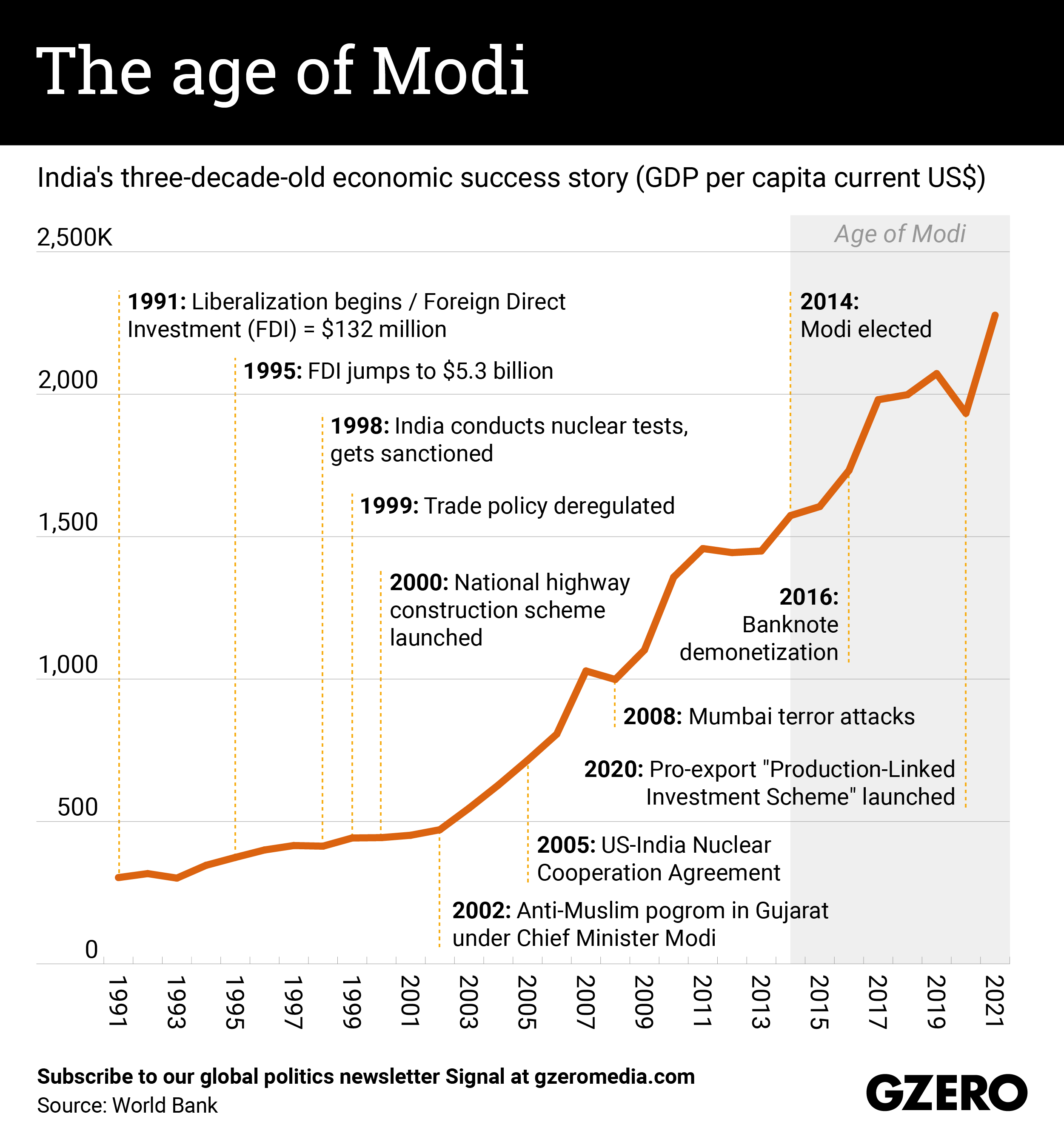India, now the fastest-growing major economy on the planet, is expected to become the world’s third-largest by 2027. But this wasn’t always the case. After independence in 1948, India’s closed markets and notoriously red-taped “License Raj” kept growth and foreign investment at bay until financial reforms were passed in 1991. From thereon, growth has accelerated. Despite a change of hands between the two major parties — the Congress and the BJP — financial and market reforms have continued consistently without any significant rollbacks. Today, PM Narendra Modi continues previously planned policies of privatization and digitization, with an emphasis on export incentives, to keep driving the Indian economy moving forward. The lesson? Consistency is key. We explore the big milestones and hiccups in the last 30 years of Indian economic growth.
More from GZERO Media
US President Donald Trump’s “Liberation Day” tariffs have been met with anger, outrage, and disbelief in every corner of the world – including islands inhabited solely by penguins. At last count, over 50 countries want to talk trade with Washington, while in the US, opposition to Trump’s presidency is getting organized. Here’s a look at this weekend’s reactions.
Netanyahu and Trump to talk tariffs, terror, Turkey, and more at White House on Monday
Israeli Prime Minister Benjamin Netanyahu will meet with US President Donald Trump at the White House on Monday. It will be his second such visit since Trump’s inauguration in January, and it comes after the president’s impromptu invitation last Thursday, when the two men spoke by phone about new US tariffs. They are expected to discuss those – and a whole lot more.
Thousands of supporters of France’s far right gathered at Place Vauban in Paris on Sunday to support Marine Le Pen, leader of the National Rally party. Le Pen was recently convicted of embezzling European Union funds to pay staff, resulting in a five-year ban on holding public office, effectively barring her from France’s 2027 presidential election.
Members of the M23 rebel group stand guard as people attend a rally addressed by Corneille Nangaa, Congolese rebel leader and coordinator of the AFC-M23 movement, in Bukavu, eastern Democratic Republic of Congo, on Feb. 27, 2025.
Representatives of the Democratic Republic of Congo and the M23 rebel group held peace talks in Doha, Qatar, last week to resolve the armed conflict engulfing eastern DRC since January. Qatari mediators began facilitating private discussions ahead of the first formal meeting between the two groups, planned for April 9.
Listen: On the GZERO World Podcast, Ian Bremmer sits down with Venezuela’s most prominent opposition leader, María Corina Machado, who remains in hiding. They discussed the future of her country, the role of the United States, and why she believes Nicolás Maduro’s grip on power is weaker than it seems.
Venezuelan opposition leader María Corina Machado threatens the country's dictatorial regime like no opposition leader before her, and that's why she's in hiding. How does she keep the pressure on Nicolás Maduro's administration from her hideout? Ian Bremmer explains.
South Korea’s Constitutional Court on Friday voted unanimously to oust impeached President Yoon Suk-yeol over his decision to declare martial law in December. Supporters of Yoon who gathered near the presidential residence in Seoul reportedly cried out in disappointment as the court’s 8-0 decision was announced. Others cheered the ruling. The center-right leader is now the second South Korean president to be ousted.
Stocks have plummeted, layoffs have begun, and confusion has metastasized about the bizarre method the United States used to calculate its tariff formula. But Donald Trump says it’s “going very well."
